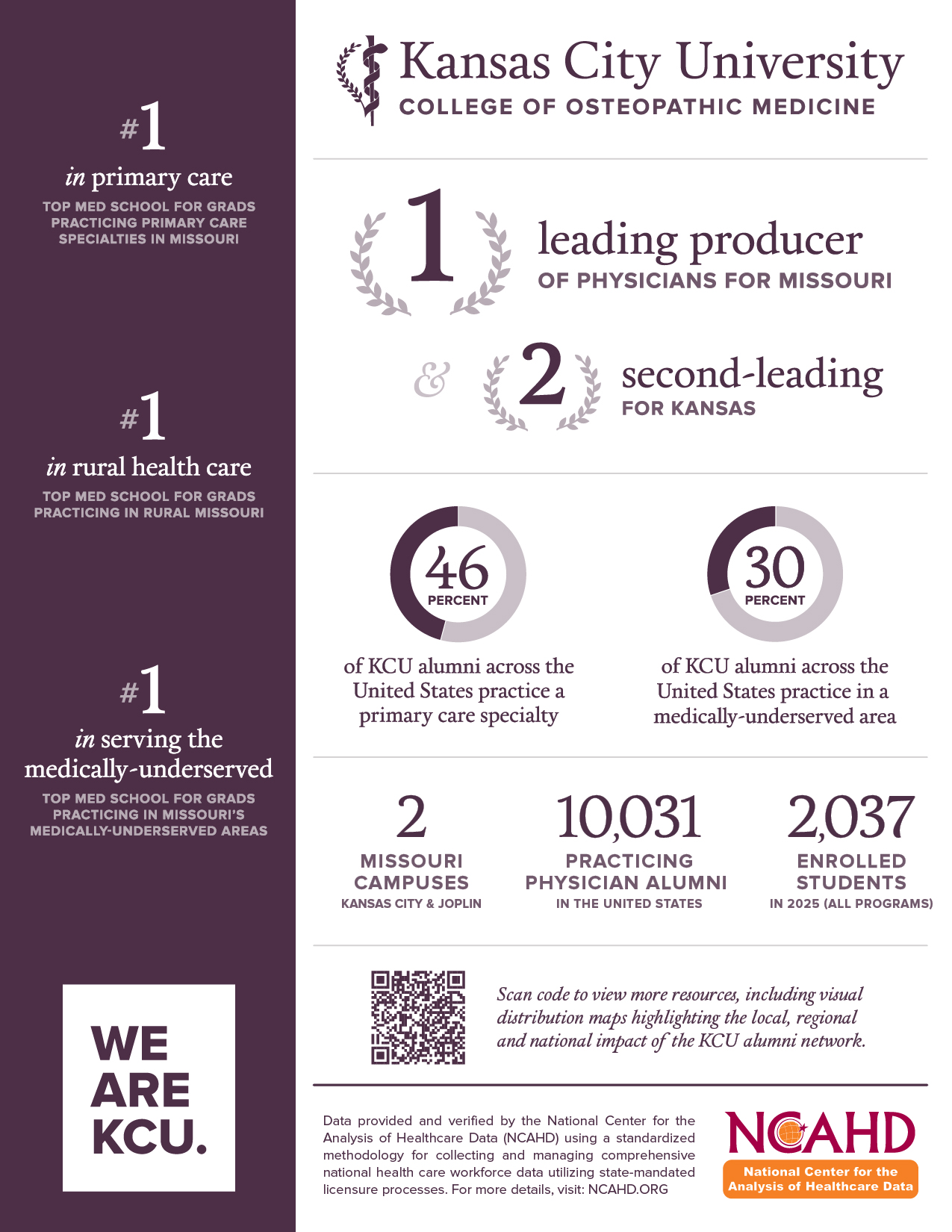A newly released report from the National Center for the Analysis of Healthcare Data (NCAHD) identifies Kansas City University (KCU) as an impactful force in addressing the growing demand for physicians across Missouri, Kansas, and the nation. The comprehensive study, which tracks the practice locations of KCU’s College of Osteopathic Medicine (KCU-COM) graduates, underscores the University’s leadership in improving access to health care—particularly in underserved areas—by producing physicians who are practicing where they are needed most.
The data reveals that KCU is the fourth-largest medical school in the United States by class size, the leading producer of physicians practicing in Missouri and the second-largest in Kansas. These findings underscore the crucial role KCU plays in addressing the critical shortage of physicians throughout the region and the nation.
In Missouri, KCU is the leading producer of physicians who serve in critical health profession shortage areas. It ranks #1 in graduating doctors who go on to practice in a primary care specialty, helping to meet the growing demand for these essential services in both urban and rural communities. In Kansas, KCU alumni serve as the sole physician in nine counties – underscoring the University's vital role in ensuring health care access to rural and medically underserved areas.
KCU’s impact extends well beyond Missouri and Kansas, with graduates practicing in all 50 states and internationally. With over 10,000 alumni, the KCU College of Osteopathic Medicine graduates are shaping health care delivery across our nation.
Kansas and Missouri are both grappling with significant physician shortages, especially within the primary care specialty. The latest report from the non-profit health policy organization KFF and NCAHD indicate that Kansas alone needs 377 additional primary care physicians, while Missouri requires 1,126. This shortage is costing both states billions in revenue and thousands of jobs.
“The growing shortage of physicians, especially in the primary care specialties, is not just a statistic; it’s an urgent issue that affects the health of communities and thereby the wealth of those communities in Missouri, Kansas and across the nation,” said Marc B. Hahn, DO, president and CEO at KCU. “The success of our graduates in addressing these critical health care shortages, particularly in underserved and rural areas, reflects our dedication to educating compassionate physicians who live our mission of improving the well-being of the communities we serve.”
“By utilizing NCAHD’s data, KCU demonstrates its commitment to its alumni’s success and the continued development of health care professionals, reinforcing the strength and value of its alumni network,” said Ann Peton, director of NCADC. “With 99 percent of KCU alumni included in this dataset, KCU gains invaluable insight into their practice location and demonstrates the university’s steadfast commitment to addressing the physician workforce needs of our nation.”
With campuses in both Kansas City and Joplin, Mo., KCU is positioned to address the health care workforce crisis in both urban and rural areas, continuing to educate physicians who directly impact access to medical care for our state. In addition, the University continues programmatic offerings to also address other health professions needs in dental medicine, clinical psychology, and biosciences, and by launching an anesthesiologist assistant program in 2026.
To see how KCU is shaping the future of health care access across the country, explore the full NCAHD dataset here.





(0) Comments